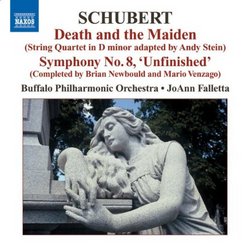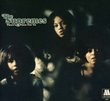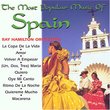| All Artists: Schubert, Buffalo Philharmonic Orchestra, Falletta Title: Schubert: Death and The Maiden; Symphony No. 8 'Unfinished' Members Wishing: 0 Total Copies: 0 Label: Naxos Original Release Date: 1/1/2009 Re-Release Date: 3/31/2009 Genre: Classical Styles: Chamber Music, Symphonies Number of Discs: 1 SwapaCD Credits: 1 UPC: 747313205172 |
Search - Schubert, Buffalo Philharmonic Orchestra, Falletta :: Schubert: Death and The Maiden; Symphony No. 8 'Unfinished'
 | Schubert, Buffalo Philharmonic Orchestra, Falletta Schubert: Death and The Maiden; Symphony No. 8 'Unfinished' Genre: Classical Schubert's music has been arranged by many other composers, though few have succeeded in — amplifying the astonishing drama and pathos of a masterpiece such as the Death and the Maiden — Quartet as has Andy Stein, who writes... more » |
Larger Image |
CD DetailsSynopsis
Product Description Schubert's music has been arranged by many other composers, though few have succeeded in amplifying the astonishing drama and pathos of a masterpiece such as the Death and the Maiden Quartet as has Andy Stein, who writes: 'I have tried to create a late classical / early Romantic symphony out of this great chamber work, so that it perhaps would sound as if Schubert himself had conceived it in this form'. The reconstruction of the Scherzo of Schubert s 'Unfinished' Symphony is based on fragments from the composer's notebooks. The last movement uses segments from Schubert's incidental music for Rosamunde, written shortly after he had set aside the Symphony, and which scholars believe may have been intended for its finale. Similar CDs
|
CD ReviewsA Schubert Transcription and a Completion of His Unfinished J Scott Morrison | Middlebury VT, USA | 04/15/2009 (5 out of 5 stars) "First, a confession: unlike some purists, I love transcriptions of all sorts -- well, I didn't like Vivaldi's 'Four Seasons' for koto ensemble -- and this CD has one that is pretty darn good. Violinist and composer Andy Stein has made a full-orchestra version of Schubert's String Quartet in D Minor, D.810, 'Death and the Maiden'. I was not really prepared to like it very much because I SO love the quartet original. And I assumed that perhaps Stein would simply paste dollops of wind and brass on top of the string quartet as given to the full string complement of an orchestra. But that is not the case at all. In fact, in most of its length this orchestration sounds as if it had been made by Schubert himself. High praise. And it is certainly more of a true transcription than the reasonably well-known one that Gustav Mahler made for string orchestra. Because the basic premise of the quartet is highly Romantic, in that it is based on Schubert's spooky song, 'Death and the Maiden', the work allows for dramatic Romantic-era orchestration that has some qualities that remind one at times of Berlioz. This performance is not a one-off: it has been played by a number of orchestras both here and in Europe. The Buffalo Philharmonic, an august group whose long history of first-class music-making has been burnished during the tenure of its music director, Joann Falletta, covers itself with glory. The Brian Newbould completion of the third movement of Schubert's 'Unfinished' Symphony is well-known, primarily from its recording more than twenty-five years ago by the Academy of St. Martin-in-the-Fields under Sir Neville Marriner. Schubert's third movement was sketched in full score for about twenty measures and in piano score for much of the rest of it. Newbould, a respected Schubert scholar, has mastered Schubert's orchestral style and his completion of the movement fits neatly with the two that precede it. Newbould also made a fourth movement out of the big B minor entr'acte from the 'Rosamunde' incidental music. On this disc, however, the finale assembled by Swiss conductor Mario Venzago uses not only that entr'acte but some fragments from a couple of ballet scenes from 'Rosamunde'. The performance by Falletta and the Buffalo is a fairly mainstream, neatly nuanced and well-recorded version. Recommended for the mildly adventurous Schubert lover. Scott Morrison " A delightful "Deaht and the Maiden" transcription, nicely pl Santa Fe Listener | Santa Fe, NM USA | 04/18/2009 (4 out of 5 stars) "I'm grateful to Scott Morrison for suplying such a detailed review; I can't add a thing to the facts. Andy Stein's orchestration of Schubert's "Death and the Maiden" Quartet achieves exactly what it sets out to do, creating another Schubert symphony. In fact, this is a plausible candidate for a Schubert Tenth, since the compoosition displays all the hallmarks of his last and greatest style. Stein has restricted the instrumentation to a simple Schubertian model, going back as early as the First Sym. (But pace Mr. Morrison, I don't hear the slightest Berliozian touches, nor any push to make Schubert sound more Romantic than he does in his own orchestration).
As far as execution goes, this work would have been spectacular if the Vienna Phil. were playing, which is no rebuke to JoAnn Falletta and the Buffalo Phil. But she could have conducted with considerably more energy, and in this essentially straightforward performance the orchestra sounds like a reasonably good regional group on the order of Nashville, San Diego, and Indianapolis. As for the "Unfinished," where Falletta and company are up against world-class competition, she paces the music fairly briskly (just over 10 min. each for the traditional two movements), which doesn't leave much room for tender phrasing. Still, the orchestral tone is sweet and the playing nicely coordinated. The completed Scherzo by Newbould doesn't sound very authentic to me in its basic sound, and the material feels ordinary. Who knows what Schubert woould have done with it? The cobbled together Rosamunde finale doesn't work since we all know this music in its familiar setting (you couldn't tack the Egmont Over. to the end of the Eroica and expect it to sound like a finale). " |



